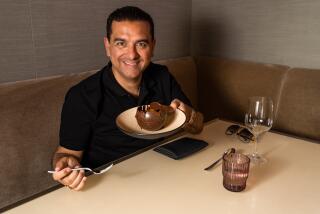BOOK REVIEW : Strip-Mining Remnants in Bensonhurst : A TIME FOR WEDDING CAKE <i> by Salvatore La Puma</i> W. W. Norton $18.95, 288 pages
- Share via
Returning to territory thoroughly prospected in his short story collection, “The Boys From Bensonhurst,” Salvatore La Puma now strip-mines that same Brooklyn claim in a novel. Set in the years immediately following World War II, “A Time for Wedding Cake” follows the fortunes of two Italian-American brothers living in the hermetic world of a small blue-collar enclave of Italian immigrants.
Mario is the older and tougher of the Leone boys; an ex-Marine with multiple decorations, a healthy ego and a rambunctious libido. The narrator, Gene, the first Leone to attend college, becomes a fifth-grade teacher, but in other respects, the differences between the bricklaying Mario and the bookish Gene seem minimal. There’s also younger sister Patricia, as precocious as her brothers and equally eager to escape the suffocating family restraints.
Although they’ve remained indissolubly married, the parents have been carrying on their own private Sicilian vendetta ever since their wedding, a rage that simmers like Vesuvius. On one memorable occasion, the hostility erupts in a food fight that leaves spaghetti on the walls and both sons pathologically wary of permanent involvements of their own.
That pivotal incident allows La Puma to devote two thirds of his novel to the amatory adventures of the brothers, as they pursue “fat and sassy” neighborhood girls who have apparently emerged from parochial school with far fewer sexual inhibitions than one might expect. Although virginity is clearly the coin of the realm, these Bensonhurst girls are gamblers, lavish with their favors but obsessive in their pursuit of marriage.
The boys are fast and elusive, deflowering entire city blocks before finally submitting to wedlock. As the elder, Mario has first choice, although Gene seems quite content with his brother’s discards. He is, in fact, engaged to one of them when another girl, a plain but passionate librarian with whom he’s been carrying on a relatively tepid affair, suddenly turns into a fury and seduces him away from his intended.
Jilted by both Leones, Julietta settles for an older man and returns to her job in a mental hospital, a fact that will become crucial when Gene needs a hide-out somewhat later in the book. In what may be the most entertaining segment, Gene becomes Julietta’s guest in the madhouse, pretending to be a depressive, a natural choice given the circumstances.
After their marriages, the brothers’ lives take a distinctly melodramatic turn. The father dies, and, in accordance with Sicilian custom, is prepared for burial by the sons. (Here the author’s flat declarative style is perfectly suited to the stark realism of the scene, though elsewhere in this increasingly Gothic tale, the utilitarian prose seems at odds with the bizarre events described.)
Then, just as Mario’s bricklaying gifts are bringing him a measure of prosperity and his marriage to the local doctor’s daughter is flourishing despite social and cultural differences, he is pinned under a cement mixer and becomes a paraplegic. The tragedy thwarts his hopes for fatherhood until Gene agrees to a procedure that will ensure continuance of the Leone heritage. Unfortunately, this turns out to be neither as simple nor as clinical as it should be, exacerbating the tensions between Gene and his tempestuous wife.
Matters have hardly returned to normal when Gene is seduced again, by the widow of his sister-in-law’s father, the accommodating nurse, Julietta, with whom he’d enjoyed one of his earliest affairs. The reborn romance escalates until Gene is skipping school to spend afternoons in a seaside love nest. In an ordinary novel, such dalliance might result either in divorce or remorse, but these boys and girls from Bensonhurst are Sicilians, and the obvious solutions are not their style.
In a climax that owes more to Grande Guignol than to grand opera, Gene’s wife takes her revenge, an act that sends the narrator into his masquerade at the mental hospital. The resolution, when it comes, is not one that a critic can live with, despite the author’s assurance that the protagonists will manage.
Next: Jonathan Kirsch reviews “New World Avenue and Vicinity” by Tadeusz Konwicki (Farrar, Straus & Giroux).
More to Read
Sign up for our Book Club newsletter
Get the latest news, events and more from the Los Angeles Times Book Club, and help us get L.A. reading and talking.
You may occasionally receive promotional content from the Los Angeles Times.






